Best Weight Loss Teas and How to Use Them: Consumer Guide

You’ve heard about them in the media — maybe you’ve even tried them out yourself. But how do weight loss teas work? Do they even work at all?
Welcome to the Organic Authority Guide to Weight Loss Teas, where you’ll find answers to these questions and a whole lot more.
We’ve rounded up the most beneficial teas to aid in weight loss and checked in with experts on how exactly they work. And because weight loss teas are such a hot topic, we’ve busted a few myths on them as well.
But before we start, let’s get one thing straight: teas are no miracle cure. In fact, when it comes to weight loss, that’s never what you should be looking for.
Chris Kilham, an herbalist known as the Medicine Hunter, highlights the importance of having the right attitude towards weight loss before beginning any new program or regimen. “Just drinking tea is not a smart strategy for weight loss,” he says. “It’s funny. People gain weight over long, long periods of time, and they expect to lose it quickly – that’s not gonna happen.”
Instead, he recommends including drinking teas with weight loss inducing properties as part of a change in lifestyle – a change that comprises — shocker! — eating fewer calories and exercising more. Weight loss is an entire body experience. In order to change your body, you have to make a lot of changes; drinking tea alone is not going to cut it.
“I can say with some certainty that drinking a ‘weight loss’ tea will do almost nothing to help you lose weight if you’re not also changing your diet and exercising on a daily basis,” says Lindsay Kluge, a clinical herbalist and licensed nutritionist.
“There is no miracle to weight loss. No quick fix. It’s not easy,” confirms Bryce Wylde, an expert in alternative medicine and the medical advisor for the Dr. Oz show. “But with a little perseverance and dedication an ideal weight is absolutely attainable. And the winning program should contain tea!”
So now that we’re all on the same page, we can get down to business, namely exploring the wonderful world of weight loss teas.

Tea image via Shutterstock: Africa Studio
Kilham divides weight loss teas into several different groups. “People can lose weight as a result of different biological strategies,” he says. “So they can lose weight as a result of greatly boosting their metabolism, they can lose weight as a result of diuretic activity, that is reducing water weight, and they can also lose weight as a result of lipolytic activity, those agents in teas that can actually break down fats in the body.”
With these characteristics in mind, we’ve divided weight loss teas into a few groups, in order to take a closer look.
Diuretics: Cleansing Teas
Some teas that boost weight loss are not actually boosting fat loss, but rather water loss. But wait – if you want to lose weight, why would you want to just lose water weight?
It’s a touch more complicated than that, as Kilham explains. “A lot of people who want to lose weight probably have too much salt in their diets, and too much salt in their diets means an imbalance between sodium and potassium, which means that sodium is keeping excess water weight in your body,” he says. “The teas that help with water reduction are potassium rich; that helps you to basically shed weight.”
And what’s more, Kluge notes, teas that help you cleanse your body promote better and more effective digestion and metabolism of a whole based food diet — which is really the diet you should be planning to follow if weight loss is your ultimate goal.
A Warning Against Senna and Other Laxative Teas
Some so-called “cleansing” teas include herbs with laxative properties like Senna, but most of our experts do not recommend these. In fact, Senna is a very powerful laxative that can have adverse effects, particularly when used over the course of several days. While as a doctor-recommended, occasionally used laxative, Senna is not necessarily dangerous in and of itself, using laxative substances to promote weight loss is not a long-term asset.
Most of our experts opt instead for herbs that prompt diuretic effects rather than laxative effects.
Parsley Tea: An Excellent Diuretic
One of Kilham’s key recommendations is parsley tea, which is a powerful diuretic allowing you to eliminate a lot of water weight quickly.
While you can purchase parsley tea infusions, you can also make fresh parsley tea by pouring a quart of water over a bunch of fresh, chopped parsley. Infuse for 20 minutes, then strain and drink hot or cold.
Other Diuretic Teas
While parsley is perhaps the most powerful common diuretic tea, there are dozens more, including infusions of dandelion, horsetail and stinging nettle. Many of these infusions can be made either with a store-bought infusion or with fresh herbs or roots at home.
Because of their diuretic properties, all of these teas are also used for other side effects of water retention like bloat and puffiness. While not directly linked to weight loss, reduction of these symptoms can get you feeling better quickly and well on your journey towards fat loss.
Thermogenesis via Metabolism-Boosting Teas
Not all tea-related weight loss is due to diuretic characteristics. Some teas actually increase thermogenesis, allowing you to raise your metabolism and burn more fat.
“Scientists have studied the relationship between tea and metabolism, the effects on blood glucose and cholesterol levels, and tea’s ability to impact free radicals and oxidative stress – the very reason we’re told to consume blueberries and drink more tea,” says Wylde. “Metabolism isn’t just the activity that burns off excess fat. It is that which doesn’t allow fat to accumulate in the first place!”
With that in mind, one of our main goals when choosing foods and teas to incorporate into our diets with weight loss in mind should be heighten our metabolism, and that’s where the following teas come into play.

Green tea image via Shutterstock: Nishihama
Green Tea: A Fat-Blasting Super Drink
Green tea is a bit of a superstar when it comes to fat loss. While all green tea originates from the same plant species as black tea — Camellia Sinensis, a plant that is now grown all over the world, but originally hails from China — green tea offers added benefits thanks to the unique way that it is processed. As opposed to black tea, green tea is not oxidized before being dried, lending it its paler color and lighter flavor.
Kris Sampson, a certified health coach and founder of the Vail Diet, highlights the numerous ways that green tea can help with weight loss, including “the catechins in green tea – in particular one called epicallocatechin-3-gallate, more commonly referred to as EGCG.”
Wylde has also encountered EGCG in his work with teas. According to him, this antioxidant can increase metabolism by up to six percent — which is definitely an interesting stat if your goal is weight loss.
According to Sampson – and a 2005 Japanese study she references – body weight, BMI, waist circumference, body fat mass and subcutaneous fat area were significantly lower in people who consumed 690 mg of catechins per day for 12 weeks – about 4-5 cups of tea a day, which might seem like a lot! But Kilham also highlights the importance of using lots of tea to see results, particularly green tea.
“If you’re gonna drink green tea, drink three cups a day,” he says. “Drink it every day. Drink it for years. It’s only gonna do good things for you, it’s only gonna reduce the risk of cancer, it’s only gonna boost cardiovascular health, it’s gonna help with immune function, and it’ll also help to slowly, steadily reduce that weight.”
But fat burning is not the only benefit of green tea in terms of weight loss. “Another reason green tea can help blast fat is simply because it contains caffeine,” says Sampson. “As we all know, caffeine is a stimulant. It has been shown to improve performance during your workouts, allowing you to burn more calories.” All teas that hail from the Camellia Sinensis contain this caffeine boost which, studies have shown, can help boost thermogenesis and metabolism, particularly when paired with the aforementioned catechins.
White Tea: Green Tea’s Little Cousin
Green tea is not the only tea to contain these high levels of catechins — you’ll also find them in white tea, which has been drunk in China since the Ming Dynasty. If it has comparable active ingredients, it’s because white tea hails from the aforementioned plant that provides us with green and black tea. But in the case of white tea, the leaves are picked before the buds are fully opened, when they are still covered with the white-silver fuzz that gives this tea its name.
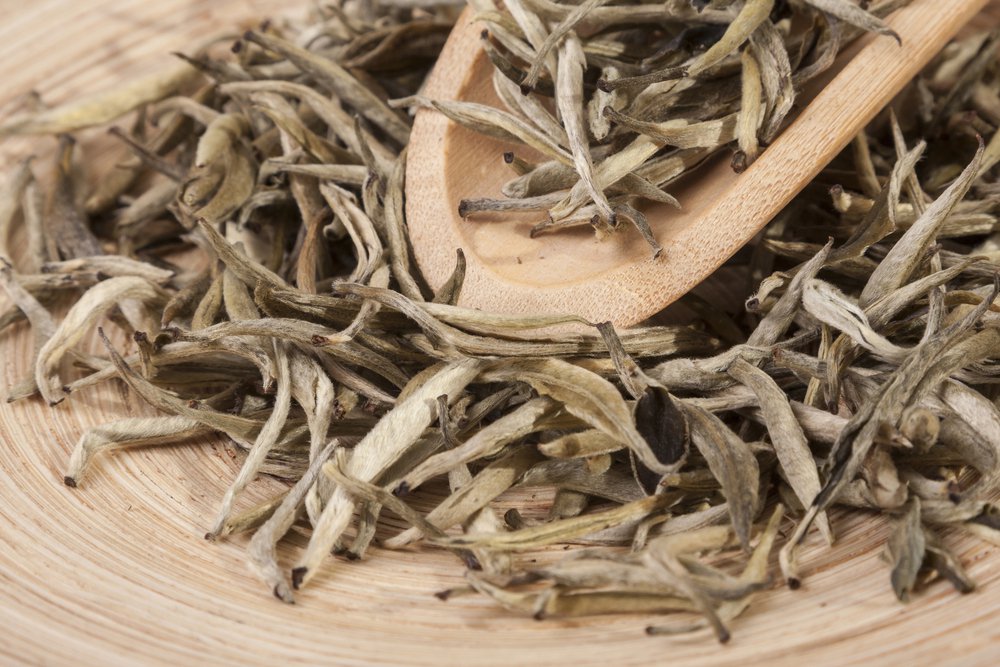
White tea image via Shutterstock: Vladimir Sazonov
Because it hails from the same plant as green tea, it’s not surprising that white tea boasts many of the same benefits.
“White tea contains what we call a fat block and prevents new fat cells from forming,” says Debbie Joyce, owner of Tea72, nipping fat gain in the proverbial bud. And that’s not all.
“White tea has the highest concentrations of EGCG,” says Wylde, making it comparable to green tea as far as benefits. With a lighter flavor, more antioxidants and less caffeine, white tea is a comparable if not superior choice to green tea, though its price can occasionally prove prohibitive.
Oolong Tea
Oolong tea is yet another tea that comes from the same plant as black, white and green, rounding the varieties hailing from the Camellia Sinensis tea bush out at four. Oolong stands out from the rest because of a specific step that calls for shaking the tea leaves so that they become slightly bruised before drying them, thereby paving the way for the slight fermentation that characterizes this tea.

Oolong tea image via Shutterstock: eAlisa
According to Joyce, oolong tea shares some of the metabolism-boosting properties of white and green tea. “Oolong tea will give that metabolism a boost to metabolize lipids,” says Joyce. “Studies show that those who drink oolong tea average losing 1 lb a week.”
Pu-Erh Tea: A Unique, Fermented Tea
Pu-Erh tea also comes from the same plant as black, white, green and oolong teas, though a special large leaf variety of this plant is used to make the strong, black tea. Whereas what we call black tea is actually referred to as red tea in Chinese, Pu-Erh tea is a true black tea with some interesting benefits.
Pu-Erh tea is fermented over a long period of time and pressed into a cake form in which it is sold. Some studies have shown that consumption of the tea suppressed the expression of fatty acid synthase in rats, thus leading them to conclude that the tea could be used for weight loss. The older a Pu-Erh tea cake is, the higher its levels of fluorine, which can eventually become dangerous. This is one of the reasons why Pu-Erh tea is frequently sold by vintage year.
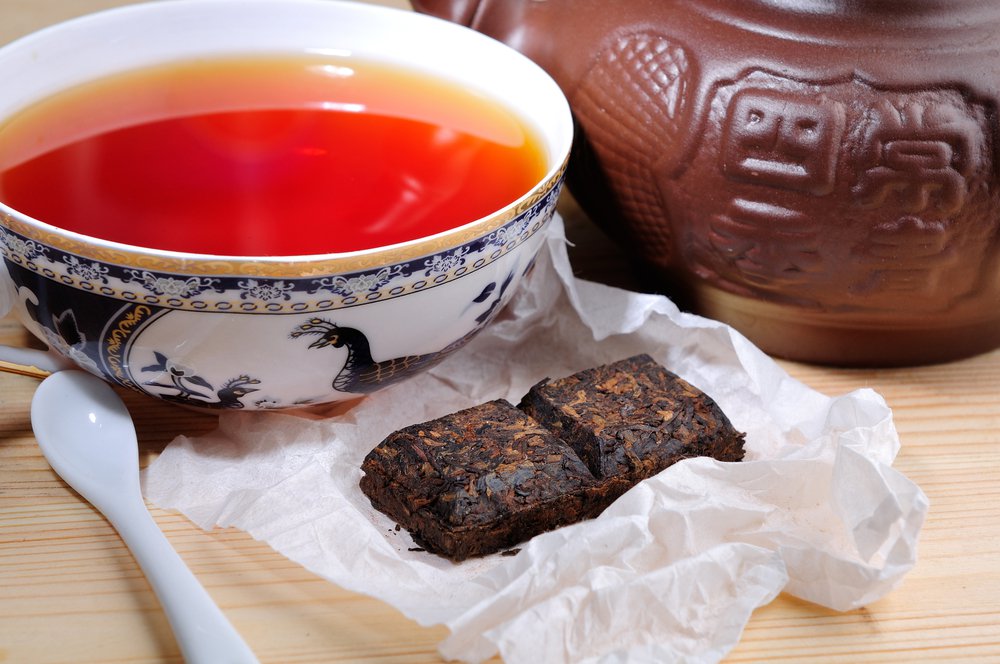
Pu erh tea image via Shutterstock: Kozlenko
Wylde recommends Pu-Erh tea in the mornings, right when you wake up. “Pu-Erh tea contains an enzyme to help “shrink” fat cells, give you a boost of energy and increase your metabolism,” he says. “Follow that up with two cups of white tea at lunch and that may help block fat absorption.”
Yerba Mate: Fat-Burning and Energizing
Yet another tea that boosts thermogenesis is yerba mate, a plant produced in South America that is frequently drunk in South American countries including Argentina, Brazil and Chile.
Yerba mate is commonly found in some energy drinks, which is really no wonder. According to Kilham, not only does yerba mate have “very good calorie burning properties,” it is also one of the only non-tea bush teas that packs a good dose of energy-inducing caffeine, which can help you get pumped for a workout.
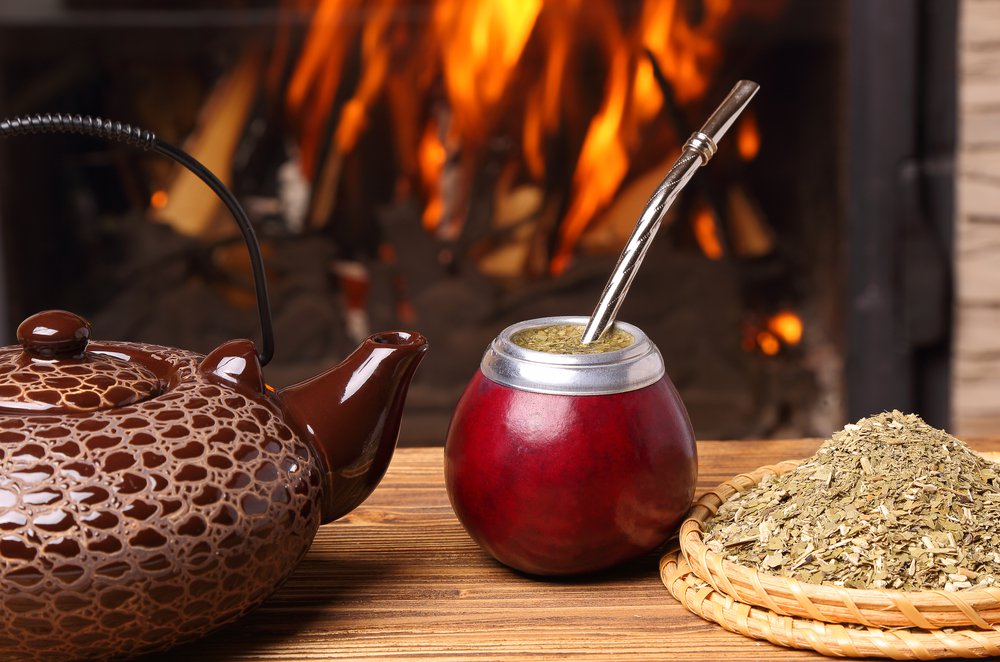
Yerba mate image via Shutterstock: Ferumov
When choosing your metabolic booster, you obviously have quite a few choices. So if you feel the need to narrow it down to one, choose green tea.
“In terms of something lipolytic, something that’s actually going to help you to increase the metabolism of fats, then green tea is your best bet,” he says. “Green tea demonstrates lipolytic activity, we know that it works, there’s a big body of science on it – it’s effective that way.”
Mythbusting: What Tea Benefits are Bogus?
People are quick to attribute characteristics to different ingredients and products, and nothing gets lips flapping more than the possibility that something helps us to lose weight. Weight loss teas are no different — even our experts have heard a few tall tales! With their help, we’re here to set things straight on a few weight loss tea myths.
1. Tea blends that are specially designed for weight loss are the best choice.
Remember the dangerous laxative Senna we mentioned? That’s found in quite a few tea blends that are labelled specifically for weight loss. That’s just one of the reasons we — and our experts — suggest that you brew teas or tisanes themselves as opposed to brewing blends labeled for weight loss.
Ellen Garcia, who holds an NC certification in nutrition and works in preventative nutrition with private clients, notably teaching cooking and nutrition, warns against purchasing blends of teas that are labeled “for weight loss” as they usually contain other ingredients aside from pure teas. “They often contain stimulants or unproven herbs for which research is questionable,” she says. “Individuals respond differently to the active ingredients in them, which makes them risky.”
Opt instead for pure teas or infusions.
2. Weight loss teas need to boost metabolism or burn fat to be useful.
A tea that encourages weight loss may do so via the diuretic or thermogenic principles we’ve discussed, but they can just as easily help in other ways — it’s all about how you define a weight loss tea.
One tea that often features on weight loss tea lists is pure peppermint tea, something that, according to Kluge, is not a weight loss tea per se. However, infusions with peppermint can act as as an appetite suppressor, or as something to distract from eating out of boredom, and peppermint is not the only one on this list.
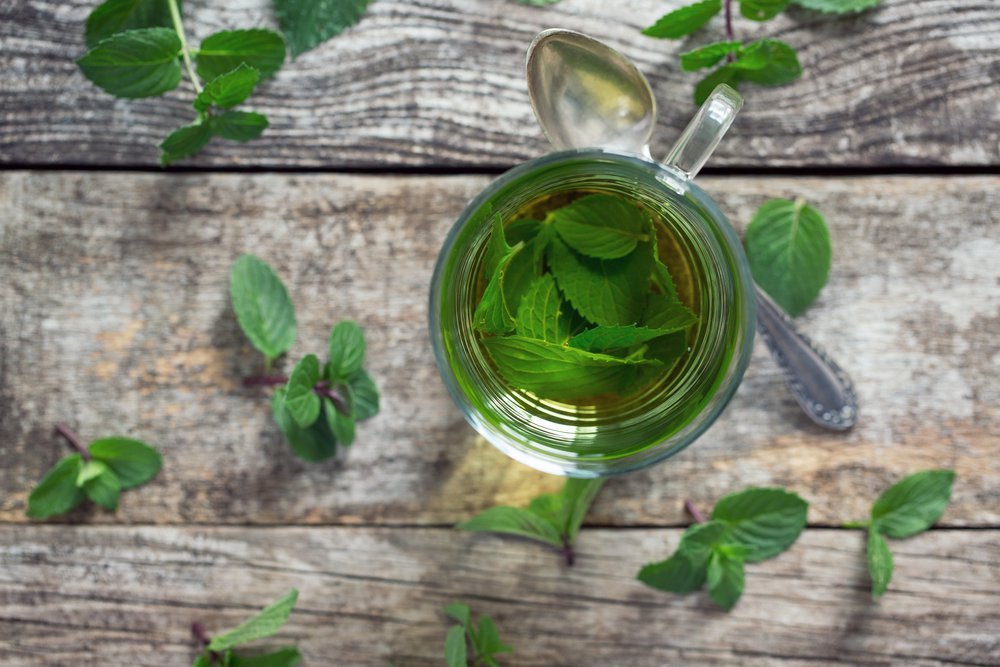
Peppermint tea image via Shutterstock: Marisc
“Anything with cinnamon in it will have ‘sweet’ properties that may help satisfy a sweet tooth,” Garcia says. Other teas like this include rose tea, bilberry tea and star anise tea, all of which have a certain amount of sweetness and flavor that allow you to avoid that evening snack that stems from boredom or a sweet tooth instead of real hunger.
Other teas that might help with weight loss in unusual ways are rooibos tea which, thanks to its stress-busting flavonoids, can blast away anxious cravings, or sobacha, a buckwheat tea that Valerie Orsoni, a health and wellness expert and author of LeBootCamp Diet, recommends for its hydro-soluble fiber, which can curb hunger pangs.
3. Weight loss is a physical endeavor, so weight loss teas must have a physical benefit.
Weight loss is a whole-body experience; your psyche will have a lot to say with regards to whether your weight loss journey is successful or not! Second-degree weight loss benefits, like those listed above, can also include teas that target your emotional well-being.
“I used to drink a cup of milky coffee every afternoon when I started to tire from my day, which perked me up for about an hour – until I crashed, which left me craving carbohydrates,” Garcia recounts. “Now I have a cup of green tea instead, which provides a little boost, with no crash, even though it has far less caffeine.”
Keeping your emotions stable and avoiding afternoon crashes will keep you from stress eating; that’s why Kilham recommends guayusa, an Amazonian tea. “They call guayusa the night watchman,” he says. Not only do native Amazonians use to to stay up late, but they prefer it to other caffeinated beverages thanks to the amino acid L-theanine which, according to Kilham, gives the tea a non-jittery boost. Wylde calls this amino acid “a clean, non-stimulating source of energy” that will keep you alert and focused, and that’s good news, both for mindset and for weight loss.
How to Use Weight Loss Teas
It’s always best to consult a doctor before making big changes in your day-to-day eating routine. Many of these teas can have adverse effects when taken in large amounts or in combination with medications. Be sure to check with your doctor before consuming teas, especially if you are on medications or if you are pregnant or breast-feeding.
Once you have your doctor’s approval, here are a few guidelines for choosing the weight loss tea regimen that’s right for you.
1. Remember that everyone is different.
First and foremost, it’s important to note that not everyone will see the same results with every tea.
Tiffany Cruikshank, (L.A.c., MAOM, RYT) is a health and wellness expert, author of “Optimal Health for a Vibrant Life,” and founder of Yoga Medicine. She tailors each weight loss tea regimen to her individual clients, suggesting adaptogenic herbs for older clients or Gymnema Sylvestre for women with blood sugar issues.
And it’s not just a matter of who you are, but how you gained the weight in the first place.
“If your problem is mainly due to stress, then you will need relaxing teas that will help, indirectly, reduce cortisol levels,” says Orsoni. “If your weight issues stem from too much toxins in your food and environment, then you will need a tea containing boxing flushing compounds. And if your extra pounds are due to water retention, on top of drastically reducing your salt intake, a tea loaded with dandelion and cherry stems will greatly help.”
Once you uncover the source of your weight gain, it will be easier to decide how best to proceed in losing it.
2. Consider how and when you drink your tea.
All teas are not suited to all times of day. Some teas, such as green, oolong and white teas that have caffeine in them, are best for the morning or before a workout. Other teas are more calming or soothing and are better suited to the evening. These include sweeter infusions like mint and cinnamon that can replace an evening snack in front of the TV, particularly for people with a sweet tooth.
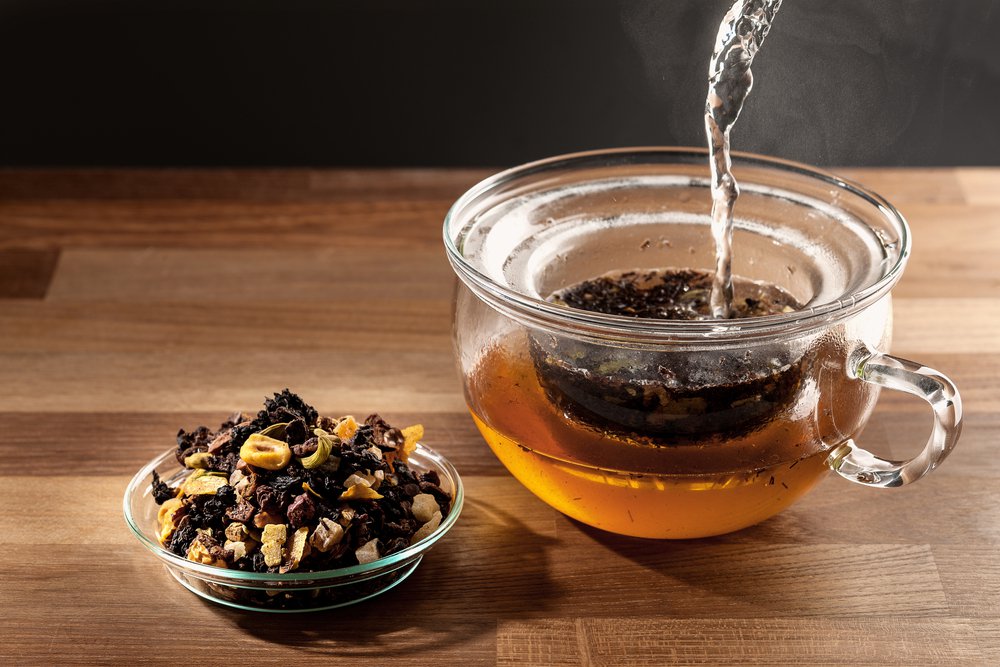
Tea image via Shutterstock: oknoart
And how about whether tea should be consumed hot or cold? Some experts say it doesn’t matter, like Kilham, who says that “either way is fine.”
Sampson, meanwhile, says that “hot tea has been shown to be much more beneficial than cold for weight loss. It might be because hot tea has more antioxidants, or possibly because people tend to add sugar to iced tea.”
For now, the experts are divided, so drink it the way you like, but be wary of adding too much sugar or milk to your tea, which can add more calories and detract from the benefits.
3. Drink your tea.
Our experts all have differing opinions on certain aspects of weight loss teas, but there is one thing they all agree on: teas should be drunk.
“Isolated theanine such as found in concentrated supplements, or added to products, may not be as effective as the natural theanine in green tea,” says Garcia. “There is a possibility that isolated theanine does not cross the blood-brain barrier in many people, making it virtually useless.”
Lots of information to digest! To help, make yourself a cup of digestion-boosting peppermint tea, and take a look at our handy charts, detailing the different benefits of weight loss teas.
Cleansing Teas
| Type of Tea | Origin | Metabolism-Booster or Cleansing? | Caffeine? | How it Works | Active Ingredient | How to Use it | Contraindications and Warnings |
| Senna | North Africa and Southeast Asia | Cleansing (laxative, not diuretic) | No | Laxative properties promote daily bowel movements | Chrysophanol | Senna is used for its laxative properties in order to help drop weight quickly and ease constipation. | Warning: Senna is a powerful laxative that can cause serious health issues when used over a long period of time, including problems absorbing nutrients. Consult a physician before using. |
| Parsley | Mediterranean | Cleansing | No | Diuretic | Flavenoids, luteolin and apigenin | Drink several cups of parsley tea daily to take advantage of its diuretic effects. | Excessive consumption of parsley should be avoided by pregnant women because of possible uterotonic effects. |
| Dandelion | Native American | Cleansing | No | Helps with water retention and upset stomach | Apigenin, luteolin and gallic acid | Brew tea from fresh or dried dandelion roots or leaves and drink 1-2 cups a day to help ease water retention. | Can cause serious allergic reactions in people who are allergic to ragweed. |
| Milk Thistle | Mediterranean | Cleansing | No | Natural detox; liver repair | Silymarin | As part of a natural cleanse | May cause diarrhea and upset stomach. May mimic the effects of estrogen, so should not be taken by women with fibroid tumors or with feminine cancers. |
| Artichoke | Vietnam | Cleansing | No | Flushes toxins out of the system | Cyanin | The Vietnamese drink artichoke tea iced or chilled. | |
| Bladderwrack | North Atlantic Ocean | Cleansing | No | Boosts energy; natural laxative properties | Iodine, L-fucose compounds | Brew tea from the dried seaweed | Do not use bladderwrack if you have thyroid problems or if you are on any coagulation medications. Do not use if pregnant or breast feeding. |
Metabolism-Boosting Teas
| Type of Tea | Origin | Metabolism-Booster or Cleansing? | Caffeine? | How it Works | Active Ingredient | How to Use it | Contraindications and Warnings |
| Green Tea | China | Metabolism-booster | Yes | Metabolizes fat stores from your cells | Catechins | Ideal to drink before a workout; drink in large quantities, 2-4 cups per day (no more or caffeine content becomes dangerous) | Green tea may exacerbate the following conditions: anemia, heart conditions, diabetes, IBS, glaucoma, high blood pressure, liver disease and osteoporosis |
| White Tea | China | Metabolism-booster | Yes | Metabolizes fat stores from your cells and prevents new fat stores from forming | Catechins | Drink several cups all day long | White tea may exacerbate the following conditions: anemia, heart conditions, diabetes, IBS, glaucoma, high blood pressure, liver disease and osteoporosis |
| Oolong Tea | China | Metabolism-booster | Yes | Helps metabolize fats more efficiently | Catechins | Drink several cups all day long; avoid drinking too close to bedtime to avoid adverse effects of caffeine. | Oolong tea tends to be very high in caffeine. It may exacerbate the following conditions: anemia, heart conditions, diabetes, IBS, glaucoma, high blood pressure, liver disease and osteoporosis |
| Pu-Erh Tea | China | Metabolism-booster | Yes | Shrinks fat cells; inhibits absorption of fat | Catechins, gallic acid | As a morning beverage, before or with breakfast | Some pu-erh tea has been tested for very high levels of fluorine. Be sure to drink your pu-erh tea soon after purchase to avoid it aging and developing this problem. |
| Yerba Mate | Paraguay | Metabolism-booster | Yes | Boosts thermogenesis; calorie-burning properties | Polyphenols and xanthines | Before a workout for an energy boost | Yerba mate can be very high in caffeine. When taken in large amounts, it can have potentially dangerous laxative effects and has been linked to a higher risk of developing certain cancers. |
| Hibiscus Tea | South America | Metabolism-booster | No | Boosts metabolism | Antioxidants and anthocyanins | For dessert or snack, thanks to its naturally sweet flavor. | The manganese content of hibiscus tea may exceed recommended limits when consumed at over 2-4 cups a day. |
Other Teas for Boosting Weight Loss
| Type of Tea | Origin | Caffeine? | How it Works | Active Ingredient | How to Use it | Contraindications and Warnings |
| Peppermint Tea | Ancient Egypt and Rome | No | Suppresses appetite | Menthol | For dessert or an evening snack | Do not use if you have gastroesophageal reflux or active gastric ulcers |
| Cinnamon Tea | Southeast Asia | No | Curbs appetite and calms stomach | Antioxidants | For dessert or evening snack, thanks to its naturally sweet flavor. | Naturally present coumarin can cause liver damage in large amounts. Consult a doctor if you have liver illness or problems. |
| Bilberry Tea | Southeast Asia and North Africa | No | Curbs appetite | Flavenoids and catechins | For dessert or an evening snack, thanks to its naturally sweet flavor. | May interact with diabetes medications or anticoagulants. |
| Star Anise Tea | China | No | Calms stomach and suppresses appetite | Anti-spasmodic compounds | For dessert or evening snack, thanks to its naturally sweet flavor. | The FDA cautions against brewing Japanese star anise tea, which may be toxic. |
| Rooibos | Southern Africa | No | Regulates the storage of fat by reducing stress hormones and stress eating | Aspalathin flavenoid | To stave off stress eating | May interact with chemotherapy drugs. May cause liver damage when taken in large amounts. |
| Buckwheat Tea (Sobacha) | Japan | No | Helps curb appetite | Hydro-soluble fiber and antioxidants | Instead of a midday snack. | Buckwheat can sometimes cause serious allergies. It may lower blood sugar levels. |
| Guayusa | Amazon | Yes | Boosts metabolism | L-theanine and alkaloids | Drink to get a boost of energy without the anxiousness of caffeine. | Should not be used by pregnant or breast-feeding women or anyone with caffeine sensitivity. |
Once you’ve decided which tea is right for you and your weight loss goals, it’s time to source them. Here are some recommendations from our editors and experts:
- Orsoni sells her own line of Sobacha teas, specially designed for different times of day and weight loss goals
- Try organic yerba mate, which is sold loose and can be brewed in a tea ball
- This 2004 Puh-Er tea cake is ripe for the drinking right now!
- This case of peppermint tea bags is perfect when you’re just looking for a simple infusion for the evening.
- Organic green tea is easy to brew in bags as well.
- You can also opt for loose, full-leaf green tea instead.
- White tea is another option that’s available in small sachets for easy brewing.
- Organic white silver needle tea is the purest of the pure, for true tea connoisseurs.
Related on Organic Authority
Kombucha Tea Lovers, Get a Load of the Newest Hipster Beverage Craze: Switchel
Bask in the Glow: How to Steam Your Face with Essential Oils
4 Ways the Benefits of Drinking Tea Could Help You Live to Be 100
Top tea image via Shutterstock

